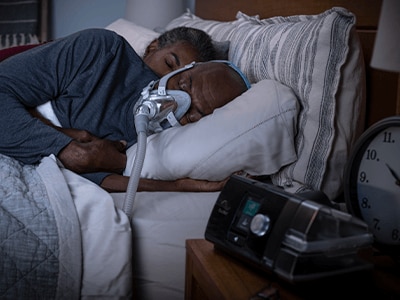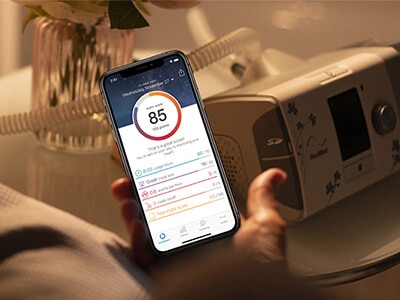Starting CPAP therapy for sleep apnoea
If you’ve been diagnosed with sleep apnoea you might be anxious about your health or about starting CPAP therapy. Try not to worry: treating your sleep apnoea is a great investment in your health and happiness and plenty of help is available. Let’s get started!
What are the benefits of CPAP therapy?
The benefits of effective CPAP therapy for sleep apnoea include a more positive mood1, more daytime energy2 and a lower risk of accidents3 . Remember: to enjoy the benefits, you should use your CPAP device every night, for as many hours as possible4.

What is a CPAP machine?

CPAP stands for continuous positive airway pressure, which is a therapy that’s commonly used to treat sleep apnoea. APAP and Bilevel devices look similar but use a different therapy algorithm. All of these machines deliver air through tubing and into a mask to keep your airway open while you sleep and help you get a good night’s rest.
The four types of obstructive sleep apnoea machine
One air pressure
A CPAP device is a fixed-pressure machine. It delivers a consistent airflow at a pressure that’s prescribed by your healthcare professional.
Auto-adjusting pressure
An APAP device is an auto-adjusting machine. It adjusts the airflow pressure level that it delivers throughout the night.
Two air pressures
A Bilevel device has two pressure level settings: a higher pressure for when you inhale and a lower pressure for when you exhale. It’s designed to improve breathing comfort for people who have trouble adjusting to airflow pressure.
Travel-friendly
Portable CPAP devices offer many of the same benefits as a traditional machine but are more convenient as they are much smaller. ResMed’s AirMini is the world’s smallest CPAP*, weighing in at just 300g and sized to fit in the palm of your hand.
Track your PAP therapy with the myAir™ app
Wouldn’t it be motivating if you could see that you’re making progress on your PAP therapy treatment?
myAir can motivate you to stick with therapy5 by giving you insight into what’s going well and helping you to solve minor issues. Try the myAir app from ResMed, designed for Air10TM PAP therapy device**.
Which CPAP mask should I choose?
Your mask is a really important piece of CPAP equipment.
A mask that’s badly fitting, uncomfortable, or impractical could make your therapy less effective and stop you from enjoying the benefits of treatment. Take the time to find the right CPAP mask for you and don’t be afraid to ask your doctor or sleep technician for help trying out different options.
Ready to start and stick with sleep apnoea therapy?
Your free therapy ebook is full of information to help you:
- Learn about continuous positive airway pressure (CPAP) and mandibular advancement device (MAD) treatments
- Understand how to use your therapy equipment correctly and resolve common problems
Complete the form and we’ll send you a copy.
Keep exploring

Starting your CPAP therapy at home
Starting CPAP therapy at home? Learn more about fitting your CPAP mask, setting up your sleep apnoea therapy equipment and maintenance tips.

Starting with the right CPAP mask
You’ll enjoy a better therapy experience with the right CPAP mask. But how can you choose the right option among the many styles and sizes of mask available?

Monitor your sleep apnoea therapy
Is my sleep apnoea therapy working? Am I still having apnoeas? Monitor your CPAP therapy and get personalised advice and assistance on making the most of your therapy with the myAir app.
Please refer to the user guide for relevant information related to any warnings and precautions to be considered before and during use of the product.
* As at 18 March 2021. 136 mm (W) x 84 mm (D) x 52 mm (H), 450 cm³.
**myAir is compatible with ResMed AirSense 10 devices and AirCurve 10 devices with built-in wireless connectivity. myAir is not available in all countries. Some features of myAir are only available in the myAir app.
***Please note the Narval CC mandibular advancement device is not available in England, Scotland or Wales.
References:
- McEvoy, R.D., et al., CPAP for Prevention of Cardiovascular Events in Obstructive Sleep Apnea. N Engl J Med, 2016. 375(10): p. 919-31.
- Wimms, A.J., et al., Continuous positive airway pressure versus standard care for the treatment of people with mild obstructive sleep apnoea (MERGE): a multicentre, randomised controlled trial. Lancet Respir Med, 2019.
- Findley L, Smith C, Hooper J, Dineen M, Suratt PM. Treatment with nasal CPAP decreases automobile accidents in patients with sleep apnea. Am J Respir Crit Care Med 2000;161: 857-9.
- Weaver, T.E. and R.R. Grunstein, Adherence to continuous positive airway pressure therapy: the challenge to effective treatment. Proc Am Thorac Soc, 2008. 5(2): p. 173-8
- Price Waterhouse Coopers. Empowering the sleep apnoea patient. A ResMed-sponsored study of how myAir users behave better. 2016.